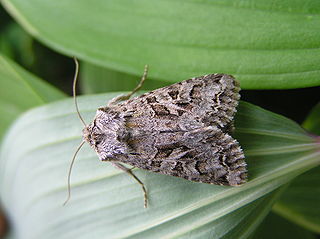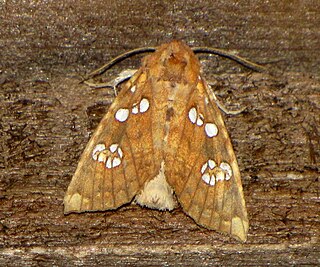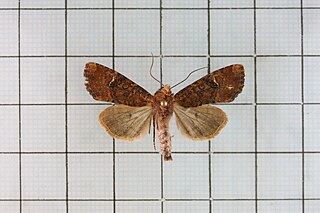
The Noctuidae, commonly known as owlet moths, cutworms or armyworms, are a family of moths. They are considered the most controversial family in the superfamily Noctuoidea because many of the clades are constantly changing, along with the other families of the Noctuoidea. It was considered the largest family in Lepidoptera for a long time, but after regrouping Lymantriinae, Catocalinae and Calpinae within the family Erebidae, the latter holds this title now. Currently, Noctuidae is the second largest family in Noctuoidea, with about 1,089 genera and 11,772 species. This classification is still contingent, as more changes continue to appear between Noctuidae and Erebidae.

Orgyia leucostigma, the white-marked tussock moth, is a moth in the family Erebidae. The species was first described by James Edward Smith in 1797. The caterpillar is very common especially in late summer in eastern North America, extending as far west as Texas, California, and Alberta.

The spot-winged antbird is a species of bird in the family Thamnophilidae. It is found in humid forest in the Amazon north of the Amazon River, and in the far western Amazon and adjacent lower east Andean slopes.

The Malagasy white-bellied free-tailed bat is a species of bat in the family Molossidae. It is endemic to Madagascar.
Elattoneura leucostigma is a species of damselfly in the family Platycnemididae known commonly as the smoky-winged threadtail. It is endemic to Sri Lanka, where it is known from only one location. It has not been found in any recent surveys. It is known from streams in dense forest habitat, and the area has undergone habitat destruction and pollution of local waterways.

Hada plebeja, the shears, is a moth of the family Noctuidae. It is found in Europe and across the Palearctic to Asia Minor, Armenia, Turkestan, Central Asia, Mongolia, Siberia. Also Kashmir.

Helotropha leucostigma, the crescent, formerly Celaena leucostigma is a moth of the family Noctuidae. It is found in the Palearctic realm.

Agrapha is a genus of moths of the family Noctuidae erected by Jacob Hübner in 1821.
Epicyrtica is a genus of moths of the family Noctuidae.

Feliniopsis is a genus of moths of the family Noctuidae.

Helotropha is a genus of moths of the family Noctuidae.

Papaipema is a genus of moths of the family Noctuidae. The genus was erected by John B. Smith in 1899.

The Erebidae are a family of moths in the superfamily Noctuoidea. The family is among the largest families of moths by species count and contains a wide variety of well-known macromoth groups. The family includes the underwings (Catocala); litter moths (Herminiinae); tiger, lichen, and wasp moths (Arctiinae); tussock moths (Lymantriinae), including the arctic woolly bear moth ; piercing moths ; micronoctuoid moths (Micronoctuini); snout moths (Hypeninae); and zales, though many of these common names can also refer to moths outside the Erebidae. Some of the erebid moths are called owlets.

Feliniopsis tripunctata is a moth in the family Noctuidae. It is found in Taiwan.

Feliniopsis africana is a moth of the family Noctuidae described by William Schaus and W. G. Clements in 1893.

Leuconitocris leucostigma is a species of beetle in the family Cerambycidae. It was described by Harold in 1878. It has a wide distribution in Africa.

Feliniopsis indistans is a moth of the family Noctuidae first described by Achille Guenée in 1852. It is found in India, Sri Lanka, Hong Kong, Japan and Taiwan.
Feliniopsis opposita is a moth of the family Noctuidae first described by Francis Walker in 1865. It is found in Kenya, Somalia, Sri Lanka and India.
This page is based on this
Wikipedia article Text is available under the
CC BY-SA 4.0 license; additional terms may apply.
Images, videos and audio are available under their respective licenses.














